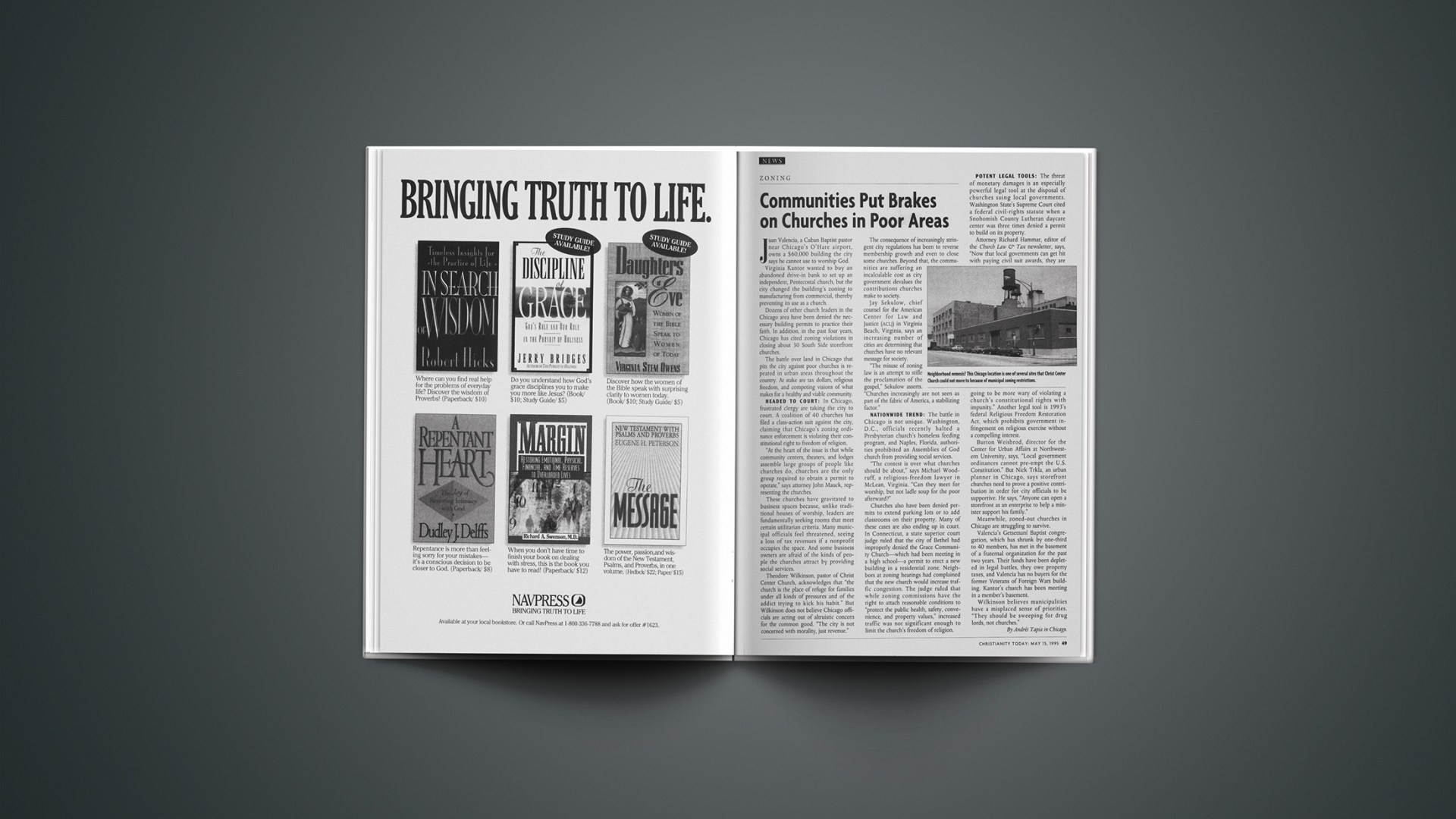Juan Valencia, a Cuban Baptist pastor near Chicago’s O’Hare airport, owns a $60,000 building the city says he cannot use to worship God.
Virginia Kantor wanted to buy an abandoned drive-in bank to set up an independent, Pentecostal church, but the city changed the building’s zoning to manufacturing from commercial, thereby preventing its use as a church.
Dozens of other church leaders in the Chicago area have been denied the necessary building permits to practice their faith. In addition, in the past four years, Chicago has cited zoning violations in closing about 30 South Side storefront churches.
The battle over land in Chicago that pits the city against poor churches is repeated in urban areas throughout the country. At stake are tax dollars, religious freedom, and competing visions of what makes for a healthy and viable community.
HEADED TO COURT: In Chicago, frustrated clergy are taking the city to court. A coalition of 40 churches has filed a class-action suit against the city, claiming that Chicago’s zoning ordinance enforcement is violating their constitutional right to freedom of religion.
“At the heart of the issue is that while community centers, theaters, and lodges assemble large groups of people like churches do, churches are the only group required to obtain a permit to operate,” says attorney John Mauck, representing the churches.
These churches have gravitated to business spaces because, unlike traditional houses of worship, leaders are fundamentally seeking rooms that meet certain utilitarian criteria. Many municipal officials feel threatened, seeing a loss of tax revenues if a nonprofit occupies the space. And some business owners are afraid of the kinds of people the churches attract by providing social services.
Theodore Wilkinson, pastor of Christ Center Church, acknowledges that “the church is the place of refuge for families under all kinds of pressures and of the addict trying to kick his habit.” But Wilkinson does not believe Chicago officials are acting out of altruistic concern for the common good. “The city is not concerned with morality, just revenue.”
The consequence of increasingly stringent city regulations has been to reverse membership growth and even to close some churches. Beyond that, the communities are suffering an incalculable cost as city government devalues the contributions churches make to society.
Jay Sekulow, chief counsel for the American Center for Law and Justice (ACLJ) in Virginia Beach, Virginia, says an increasing number of cities are determining that churches have no relevant message for society.
“The misuse of zoning law is an attempt to stifle the proclamation of the gospel,” Sekulow asserts. “Churches increasingly are not seen as part of the fabric of America, a stabilizing factor.”
NATIONWIDE TREND: The battle in Chicago is not unique. Washington, D.C., officials recently halted a Presbyterian church’s homeless feeding program, and Naples, Florida, authorities prohibited an Assemblies of God church from providing social services.
“The contest is over what churches should be about,” says Michael Woodruff, a religious-freedom lawyer in McLean, Virginia. “Can they meet for worship, but not ladle soup for the poor afterward?”
Churches also have been denied permits to extend parking lots or to add classrooms on their property. Many of these cases are also ending up in court. In Connecticut, a state superior court judge ruled that the city of Bethel had improperly denied the Grace Community Church-which had been meeting in a high school-a permit to erect a new building in a residential zone. Neighbors at zoning hearings had complained that the new church would increase traffic congestion. The judge ruled that while zoning commissions have the right to attach reasonable conditions to “protect the public health, safety, convenience, and property values,” increased traffic was not significant enough to limit the church’s freedom of religion.
POTENT LEGAL TOOLS: The threat of monetary damages is an especially powerful legal tool at the disposal of churches suing local governments. Washington State’s Supreme Court cited a federal civil-rights statute when a Snohomish County Lutheran daycare center was three times denied a permit to build on its property.
Attorney Richard Hammar, editor of the Church Law & Tax newsletter, says, “Now that local governments can get hit with paying civil suit awards, they are going to be more wary of violating a church’s constitutional rights with impunity.” Another legal tool is 1993’s federal Religious Freedom Restoration Act, which prohibits government infringement on religious exercise without a compelling interest.
Burton Weisbrod, director for the Center for Urban Affairs at Northwestern University, says, “Local government ordinances cannot preempt the U.S. Constitution.” But Nick Trkla, an urban planner in Chicago, says storefront churches need to prove a positive contribution in order for city officials to be supportive. He says, “Anyone can open a storefront as an enterprise to help a minister support his family.”
Meanwhile, zoned-out churches in Chicago are struggling to survive.
Valencia’s Getsemani Baptist congregation, which has shrunk by one-third to 40 members, has met in the basement of a fraternal organization for the past two years. Their funds have been depleted in legal battles, they owe property taxes, and Valencia has no buyers for the former Veterans of Foreign Wars building. Kantor’s church has been meeting in a member’s basement.
Wilkinson believes municipalities have a misplaced sense of priorities. “They should be sweeping for drug lords, not churches.”
Copyright © 1995 Christianity Today. Click for reprint information.
ctmay95mhg5T60049508










